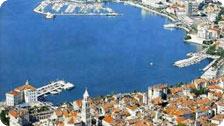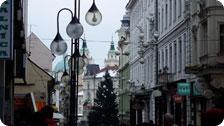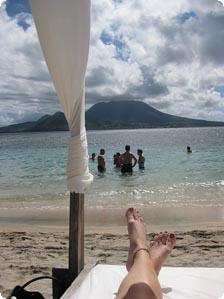by Thuc Nguyen
In April of 1998, I walked past a travel agency in South London that advertised cheap plane tickets to Croatia. I had been in England for over half a year and needed to spend some time elsewhere, but dreaded going to well-known destinations such as Paris or Ibiza. Even Prague was filling up with American expatriates.
I booked myself a flight to Zagreb, thinking I would rent a car and drive down the coast to Split and Dubrovnik. After learning that the only vehicles available were stick shift (which I had not yet mastered), I booked another flight from Zagreb (Croatia’s capital) to the seaside town of Split.
I didn’t know the language in Croatia and wasn’t even sure if I needed to apply for a visa. Yet after the Bosnian war, I was eager to go see Croatia for myself. Coming from Vietnam—a country that has also experienced regional and political divisions—I empathized with the Croats.
I packed very lightly and flew out of Heathrow. When I landed in Zagreb late at night, the small airport was deserted. There hadn’t been that many people on my flight with me; only a businessman wearing a suit and a couple of older women. I picked up my bag and headed to the currency exchange counter with my British pounds; I was lucky to arrive in time to exchange these for Croatian kunas and catch the last bus into town.
On the long ride into the city, I saw a sign for the country’s only McDonald’s: even this bastion of old Europe had been infiltrated by American capitalism. I got out at the main train depot and talked to a few cab drivers to find a hostel nearby. I could get by on my elementary conversational German; some of the drivers spoke English as well. I found a room in a nearby, dilapidated hostel. My lonely room felt like a prison cell, and I was afraid of getting bitten by small creatures that I worried might inhabit the room and cot with me.
When I awoke the next morning, I took a walk around the city. Zagreb had a colorful main square, with neon lights and big banks. The cable car trolleys displayed Benetton advertisements on their sides, and I saw theaters with posters for American movies, the titles translated into Croatian. I recognized other reminders of home, like a Coca Cola banner near an old cathedral with a gold-leafed dome. Unsure of the local cuisine, I bought a few loaves of bread and some yogurt, which I subsisted on until my flight to Split two days later. I spent the days alone, wandering around and visiting sculpture gardens and markets. At night, I tried to read as I waited for morning to come, the sounds of people fighting in a language I could not understand drifting through the room’s walls.
On my last morning in Zagreb, I carried my bag about a mile away to catch a bus to the airport. Along the way, I stopped to order an espresso. It was the strongest I had ever tasted. A few tired-looking men in their thirties populated the café. Even in this capital city, the pace of life seemed slow. Coming from London, this was an adjustment.
The plane to Split was only a small carrier, with some quasi-stylish young passengers—or maybe I should I say young women who dyed their hair and wore too much make-up. There were also some touristy types on board, who, like me, were headed to Split. Once again, I was not sure exactly where I would stay or what I would do when I got there. My escapist tendency had no agenda. We flew over the magnificent aqua and azure waters of the Aegean Sea before landing Split’s small airport, where we were greeted by a slew of U.N. Soldiers and a small, mid-century bi-plane next to the thin landing strip.
Leaving the airport, I gathered my belongings and walked downhill toward the ocean. At a bus stop, I got on the first bus that came, along with an older, peasant women. It was about a three-mile ride into the town center. Along the way, I saw piles of rubble, farm animals, and villagers. The scenery was endearing, and it felt nice to be far away from a glitzy city. I hopped off the bus and caught a taxi to the luxurious, seaside Hotel Marjan, where, in the wake of my unsettling experience in Zagreb, I decided to treat myself to one night. The hotel had a nice restaurant and bakery below, and some shops close by. I had my own balcony, which opened up to the sea, and didn’t feel as isolated as I had in Zagreb. Occupying the same building as the hotel was a Wet’n’Wild megastore. In the United States, Wet’n’Wild makeup is sold at drugstores; here, an entire shop was devoted to it. I was astounded.
In the lobby of the Marjan, I met a portly young man about my age who spoke English. He asked if I was in Split for “the sightings.” When I told him I had no idea what he was talking about, he explained that many of the hotel’s guests had made pilgrimages to Split that week because the Virgin Mary had reportedly been seen on islands off the coast. This was a surprise to me. The young man, a devout Catholic, urged me to investigate, too.
A bus station not far from the Marjan offered trips to nearby port towns. I contemplated going to Dubrovnik to see the famous fortress there. While standing in line to check out the prices, a young fellow with a frightening appearance offered to take me to Dubrovnik himself, for a fee. Boils covered his face and track marks scarred his arms. I politely declined and started walking away, but he persisted; it was obvious he was desperate for money.
I walked to a decent-looking grocery store next to the boat launches and bought some yogurt, then browsed through a nearby record store, which, unexpectedly, had the latest pop music hits from the U.K., like Blur and Pulp. I wasn’t sure how up-to-date Croatia would be; after all, I had heard reports that in Vietnam the kids were just catching onto tunes that were cool in the 1980s in the United States. As I ate my yogurt, I admired the architecture and watched old men in Speedos playing handball in the shallow water. I observed nuns on a walk, trees I had never seen before, old men in bars. I stepped into one of these dives to order an orange juice; immediately, a mature gentleman in his fifties or sixties asked me, in English, where I was from and what I was doing in Split. I think it was very peculiar to him to see a young woman traveling alone.
I walked along the town’s train tracks and was approached by an elderly woman. After chatting in German, she offered me room and board for a tenth of what I was paying at the Marjan. I followed this benign-looking woman back to her home, where she lived with her husband and her grown thirty-year-old sons, but turned down her offer; I felt unsure about the situation, and wanted to be somewhere owned and operated by people wearing burgundy blazers, who could be held accountable for my life. I thanked her and continued on.
Along a cobblestone street, I heard guys whistling at me from a third-story window. I looked up and they motioned for me join them. Naturally, I didn’t; I am normally open to meeting people, but felt it was best to keep to myself. I continued on my trek and noticed I was being followed by a dark man in his forties wearing a leather jacket. He asked if I wanted him to take my picture for me. I accepted his offer, but when he asked me if I wanted to go for a coffee with him, I said no. After that, he would not leave me alone. I decided to go back to my hotel to hide out for a while.
I unpacked, took some deep breaths, and reemerged from my room for an ice cream and to buy postcards and visit the post office. On my walk, I found some interesting gardens and ruins, presumably left by the Romans. Apparently, Split and its surrounding areas had once been popular vacation spots for all sorts of Europeans. Groups of people were enjoying the afternoon from hillside verandas and in restaurants. I passed some fashionable shops in the town square.
For dinner, I went to the adjoining hotel restaurant. The owner came by to talk with me, and when he learned I was traveling alone, he and the other wait-staff treated me especially kindly.
I had a small transistor radio with me that I brought from England, in case I got bored with visual cultural stimulation. I found some stations playing songs I knew, and one station that was transmitted in English. I called to ask if there were any upcoming shows or events in the area—for some reason, I was experiencing nightlife withdrawal. I called for a cab to pick me up at the hotel. The driver and I got lost, so in the end I told him to just drop me off where he knew there were young people my age. We had a nice conversation in English; when he dropped me off at a club called (believe it or not) Mississippi, I offered him some American cigarettes, which pleased him greatly.
Outside Mississippi, I tried to ask a group of dolled-up girls what was going on inside; they told me where the entrance was, so I gave them some clove cigarettes. Casual in jeans and a long-sleeve T-shirt, I entered the club and ordered a shot of Jim Beam, trying to maintain my composure. I smoked a cigarette to calm down, but the combination of alcohol and nicotine made me dizzy, so I walked over to a table with two empty chairs and asked the two guys seated there if I could join them. Fortunately, they were very gracious. Plopping down, I watched people on the dance floor; I didn’t really talk to my tablemates until I used the old stand-by and offered them a smoke.
Both guys were named Goran, a name I’d never heard of before. The first Goran was a tall and well built, with a crew cut and moss green eyes. The latter was smaller, more nerdy, and wore glasses. They were in an economics class together and completing their required military service, and, like me, they were twenty-one years old. I felt relieved to be in their company.
They offered me a ride to a smaller, quieter bar (which I believe was called Pino), where they practiced their English with me. Somehow we got by with hand gestures and other forms of communication. We bonded over the subject of basketball, funny enough. I grew up in North Carolina, where powerhouses UNC, Duke, and N.C. State had reigned in the ‘80s. A Croatian forward, Tony Kukoch, had played for N.C. State. He did quite well, and went on to play for the Washington Bullets. I had no idea that, like my home state, Croatia was a land of basketball fanatics.
Both Gorans worked during the day, and promised to come by the hotel and pick me up in the evening. They surprised me one day with tickets to the film Titanic, which they had to wake up at six o’clock in the morning to secure. It was amusing as hell to watch Leonardo DiCaprio with Croatian subtitles. I tried to absorb a few basic words.
The Gorans were very surprised that I walked around by myself. I told them of the people I had encountered before I met them, and they warned me that Split had its share of heroin junkies and to be really careful. The Gorans and I walked around the well-lit white brick urban areas, where the scene was festive and bright. We went to some great pastry shops and they drove me to parts of the city I would have never covered by myself on foot. We even drove to a small town further down the coast to have a nice dinner on my last night in town. They bought me a bottle of wine as a going-away present.
We covered topics relevant to people our age everywhere. I asked them what they wanted to do before they were thirty, and both said they wanted to get married—I was expecting something more along the lines of learning how to play the guitar, or traveling. I urged them to visit me in London, but they said they wouldn’t last two minutes in a place like that, even though I assured them I would take care of them there. They wanted to remain in Split and start families. They were sweet guys who would be accepted anywhere they went, but they were happy being provincial. They told me I had to return to Croatia to travel with them to the islands, and bring my family when I had one. This seemed all a bit peculiar to me because I am accustomed to being around hyper-ambitious artistic types.
The Gorans were so fantastic and easy to be with, yet there was a difference between us. On my daytime walks, I had noticed many young couples necking in public places; many people in Split live with their parents well into their thirties and do not have places to have private time. I had grown accustomed to living on my own over the last four years: having my own room in an apartment, finding my own way, preparing my own meals, doing my own laundry.
The Gorans left me with a warm feeling about Croatia, yet I was concerned for their uncertain future. We tried to correspond for a while and then, sadly, I moved and lost my address book. I had received adorable postcards from them. I still wonder what they are up to now that we are all twenty-six and half a decade has gone by.


